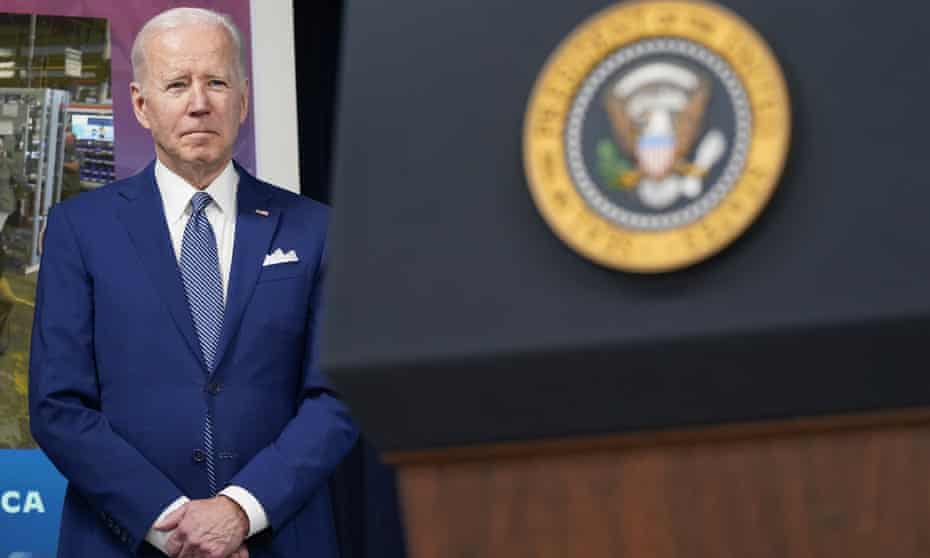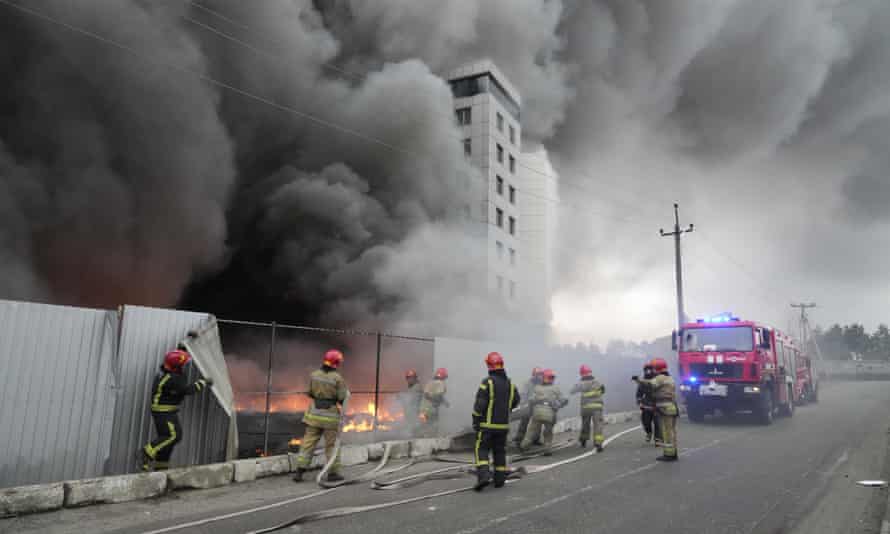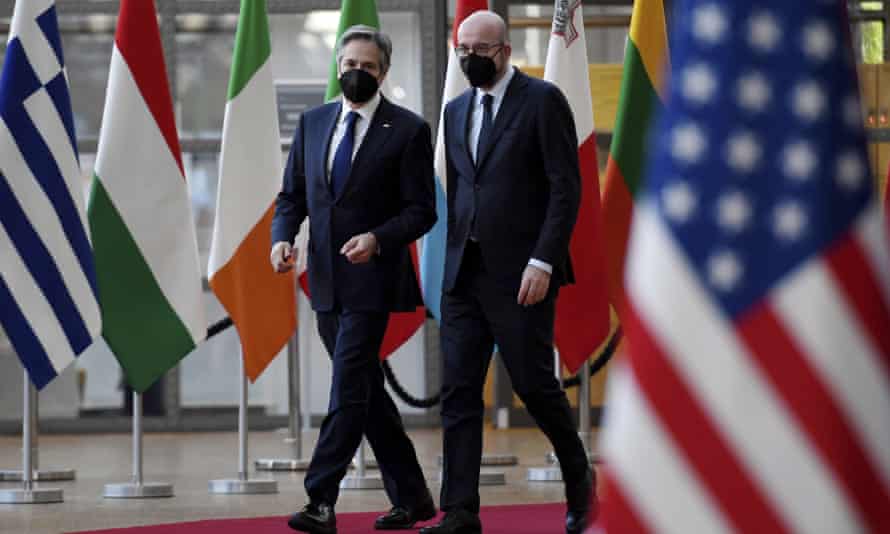
When Joe Biden made the struggle between democracy and autocracy the lodestar of his presidency, it was widely assumed that his principal antagonists would be China’s Xi Jinping abroad and America’s own Donald Trump at home.
But it is Vladimir Putin of Russia who has made the contest more immediate and literal than anyone expected, launching a bloody invasion of Ukraine that threatens to bring down a new iron curtain in Europe.
Biden, who made no mention of Putin, Russia or nuclear weapons in his inaugural address, is discovering a truism of US history: American presidencies are often defined by crises that no one saw coming.
“I am old enough to remember [British prime minister] Harold Macmillan who, when asked what was driving his actions, replied, ‘Events, dear boy, events’,” said Bill Galston, a former policy adviser to President Bill Clinton. “I’m sure when Joe Biden was running for president, the last thing on his mind was a revival of the cold war.
“He was already focused, and has been for years, on the conflict between democracy and autocracy but that was more of a frame for looking at the world than it was an operational manual. Now here we are. It’s truly extraordinary when you think about it.”
Just as Biden’s empathy was seen as ideal for meeting the moment of the coronavirus pandemic, and just as his record of bipartisanship was thought to be well suited to healing America’s divisions, so his storied foreign policy experience and faith in multinational institutions appear to bode well for this test.
That is certainly the view of Democrats who believe that Biden, who at 79 lived every moment of the cold war, including its gnawing dread of nuclear annihilation, has risen to the occasion. Last month he authorised $350m of military equipment – the biggest such package in US history – to bolster Ukraine’s courageous fighters who have exceeded all expectations.

He led an unprecedented declassification of intelligence about Russia’s intentions to invade and to justify its actions, weakening Moscow’s arguments on the world stage. Biden and his team held countless meetings and phone calls to rally western allies, helping imbue Nato with a sense of unity and purpose that many feared it had lost forever. The resulting sanctions imposed have gone further than many expected in scope and scale and could collapse the Russian economy.
Galston, a senior fellow at the Brookings Institution thinktank in Washington, commented: “The Ukraine crisis has been the Biden administration’s finest hour. The president and his senior officials have been skillful and tireless in trying to coordinate a united response. The results speak for themselves. The sanctions are extraordinary and even more extraordinary has been the turnaround in European thinking and policy. It’s been breathtakingly fast.”
But all this represents a hollow victory, critics say, because the harsh reality is that it did not prevent Putin making his move and inflicting horrific civilian casualties in Ukraine. Biden’s radical transparency included stating early and forcefully that no American troops would set foot in the country.
John Bolton, a former national security adviser to Trump, said: “It depends on what your definition of success is. The supporters of Biden say Nato’s united and I think that’s true. And Ukraine is in ashes.”
He added: “I don’t think collectively the west did what was necessary here and you can measure failure pretty clearly by the Russian army being in Ukraine. I don’t think we view our current position with equanimity.”
The US and Nato have rejected appeals to impose a “no-fly” zone, which might require their forces to shoot down Russian aircraft and draw them directly into a war with a nuclear power led by a dangerously unstable tyrant. This earned a rebuke from Volodymyr Zelenskiy, Ukraine’s president, who said on Friday that Nato “gave the green light for further bombing of Ukrainian cities and villages”.
Bolton, a former interim US ambassador to the UN, believes the opportunity for such a measure has been lost. “It’s not practical because we’ve waited this long and Biden and the UK and all of Nato have basically said, we’re not going to do it.”

“But everybody in Europe better get used to the fact that we’re going to watch something on the continent that we said in 1945 we’d never let happen again. And it’s going to happen, I think, right in front of us.”
The war in Ukraine has given an unexpected boost to Biden’s efforts to revive bipartisanship in Washington. Republicans have been broadly supportive and gave him several standing ovations when he discussed the conflict at the start of his State of the Union address last week. But the truce only goes so far.
Some Republicans argue that Biden’s botched withdrawal from Afghanistan betrayed weakness and encouraged Putin and that the invasion would not have happened if Trump was still in the White House. They say the sanctions have been too slow and incremental. And they are joining Democrats in pushing the president to ban Russian oil imports while calling for American energy independence.
Biden, however, has been reluctant to call out his Republican critics so far, and his approval rating has begun to climb since the crisis began, according to a PBSNewsHour/NPR/Marist poll. About half of the American public – 52% – said this week they support how the president is handling the situation in Ukraine. This was up from two weeks ago when about a third said they approved.
Leon Panetta, a former defense secretary and CIA director, said: “Forty years of foreign affairs experience by President Biden is paying off. We weren’t sure with Afghanistan but it clearly is paying off now in the way he’s been able to establish a unified approach between the US and our Nato allies. The bottom line is that we could not have made Putin pay a price were it not for that unity.”
There appears to have been determination not repeat the blunders of Afghanistan, when allies felt blindsided as the Taliban rapidly took over and the US and western governments fled.
Panetta, co-founder of the Panetta Institute for Public Policy, added: “Presidents are always tested by crisis but presidents have to learn from their mistakes and I think President Biden knows what he did wrong and knows now what he has to do to provide that leadership.
“In some ways I thought Afghanistan was kind of his Bay of Pigs but John Kennedy was able to come back and really establish a strong foreign policy and I’m hoping that Joe Biden can do the same. He will be tested but, having put together this unified approach, I feel confident that he will now see it see it through. You have to remain strong. You can’t blink when it comes to dealing with Putin.”
